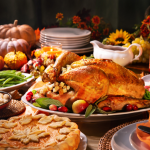As Thanksgiving approaches, many pet owners look forward to sharing the holiday spirit with their furry companions. However, veterinarians often see a spike in emergency visits during this time due to pets consuming foods that can cause upset stomachs or even more serious health issues. To ensure your pet’s safety while still allowing them to partake in the festivities, it’s crucial to understand which foods are dangerous and which can be enjoyed in moderation. This blog will help when navigating holiday foods and pets.
Dangerous Thanksgiving Foods for Pets
 While our pets may beg for a taste of that Thanksgiving feast, it’s important to note that the following foods can not only cause stomach upset but can also lead to choking and intestinal obstruction. Beware of these common holiday foods and pets:
While our pets may beg for a taste of that Thanksgiving feast, it’s important to note that the following foods can not only cause stomach upset but can also lead to choking and intestinal obstruction. Beware of these common holiday foods and pets:
- Cooked bones: These can splinter and cause choking or internal injuries.
- Onions and garlic: These contain compounds toxic to dogs and cats, potentially causing anemia. Onions are especially dangerous and should never be fed to pets.
- Grapes and raisins: Even small amounts of grapes and raisins can lead to kidney failure in dogs. Avoid them altogether.
- Chocolate: Toxic to dogs and cats, chocolate can cause vomiting, diarrhea, and, in severe cases, heart problems, especially if the cocoa content is high like it tends to be in high-quality chocolate products.
- Coffee: Similar to chocolate, coffee can cause digestive issues or worse
 Xylitol: This artificial sweetener found in many sugar-free products can cause rapid blood sugar drops and liver failure in dogs. It is often labeled birch sugar and should be carefully avoided. Beware the sugar-free gum products that contain xylitol and consider asking guests to keep their purses in coat closets while gathering in case they carry xylitol products.
Xylitol: This artificial sweetener found in many sugar-free products can cause rapid blood sugar drops and liver failure in dogs. It is often labeled birch sugar and should be carefully avoided. Beware the sugar-free gum products that contain xylitol and consider asking guests to keep their purses in coat closets while gathering in case they carry xylitol products.- Alcohol: Even small amounts can be dangerous, causing vomiting, diarrhea, and central nervous system depression.
- Macadamia nuts: This particular variety of nuts can cause weakness, depression, and hyperthermia in dogs. It’s one to be avoided entirely.
- Raw yeast dough: The dough can continue to rise in your pet’s stomach, causing gas to accumulate and potentially leading to discomfort and stomach upset.
- Fatty foods: Rich, fatty foods like gravy or buttery dishes can lead to pancreatitis, a serious and painful condition.
- Sugary treats and desserts: Our pets are not able to digest foods with high sugar content or foods that are highly processed. These foods can cause insulin spikes, discomfort, vomiting, and diarrhea.
Safe Thanksgiving Foods in Moderation
 While it’s best to stick to your pet’s regular diet, the following Thanksgiving foods can be shared in small amounts:
While it’s best to stick to your pet’s regular diet, the following Thanksgiving foods can be shared in small amounts:
- Plain, cooked turkey meat (limit skin and avoid cooked bones per the details above)
- Plain, cooked sweet potato (no added sugar or marshmallows)
- Plain, cooked pumpkin (not pie filling)
- Plain, cooked green beans
- Plain, cooked carrots
- Small amounts of plain mashed potatoes (no butter, milk, or seasonings)
- A small piece of plain, cooked apple (no seeds or core)
- Plain cranberries, raw or frozen before adding them to sugary recipes
Remember, “moderation” means just a small taste – a teaspoon or two for small dogs and cats, and no more than a tablespoon for larger dogs. It’s best to introduce new foods gradually to avoid digestive upset therefore limit the number of new foods you introduce at once.
Preventing Holiday Pet Emergencies
 To keep your pets safe during Thanksgiving:
To keep your pets safe during Thanksgiving:
- Inform guests not to feed your pets table scraps.
- Keep garbage securely covered to prevent pets from scavenging.
- Create a quiet space for your pet away from the festivities if they become overwhelmed.
- Maintain your pet’s regular feeding and exercise schedule.
- Consider preparing pet-friendly Thanksgiving treats using pet-safe ingredients.
- Beware of unsafe decor. The AVMA has pet-friendly decorating and entertaining tips here.
Addressing Holiday Pet Emergencies
 If you suspect your pet has eaten something harmful, contact your veterinarian or the nearest emergency animal hospital immediately. Signs of distress can include vomiting, diarrhea, lethargy, loss of appetite, or unusual behavior. The ASPCA Animal Poison Control and the Pet Poison Help Line are also great resources. While they charge per call, they are staffed by veterinary toxicologists on call who will ask you what your pet ate and how much to determine the best treatment option. They may be able to save you an expensive trip to the emergency vet or may save your pet’s life by urging you to take them in for veterinary attention immediately. Only they know what would be best under each circumstance.
If you suspect your pet has eaten something harmful, contact your veterinarian or the nearest emergency animal hospital immediately. Signs of distress can include vomiting, diarrhea, lethargy, loss of appetite, or unusual behavior. The ASPCA Animal Poison Control and the Pet Poison Help Line are also great resources. While they charge per call, they are staffed by veterinary toxicologists on call who will ask you what your pet ate and how much to determine the best treatment option. They may be able to save you an expensive trip to the emergency vet or may save your pet’s life by urging you to take them in for veterinary attention immediately. Only they know what would be best under each circumstance.

Park Cities Pet Sitter Holiday Care
While it’s tempting to share the Thanksgiving bounty with our pets, their health and safety should be our top priority. By being aware of the dangers and offering safe alternatives in moderation, you can ensure that your pets enjoy the holiday as much as you do. Remember, the best gift you can give your pet this Thanksgiving is a safe, stress-free environment filled with love and attention – minus the belly ache!
Park Cities Pet Sitter proudly provides cat sitting, dog sitting, and dog walking services in Bluffview, Deep Ellum, Downtown, Highland Park, Knox Henderson, Lake Highlands, Lakewood, Lower Greenville, Medical District, North Dallas, Oak Lawn, Northwest Dallas, Northeast Dallas, Old East Dallas, Preston Hollow, Turtle Creek, University Park, Victory Park.
To learn more about our services, please visit our FAQs and contact us at 214-828-0192. Finally, you may also register via our client portal here. Existing clients, please submit reservations via this link.
We wish you and yours a wonderful Thanksgiving holiday. May you and your loved ones have the opportunity to share in the spirit of gratitude and be blessed with lots of family time and delicious food!

